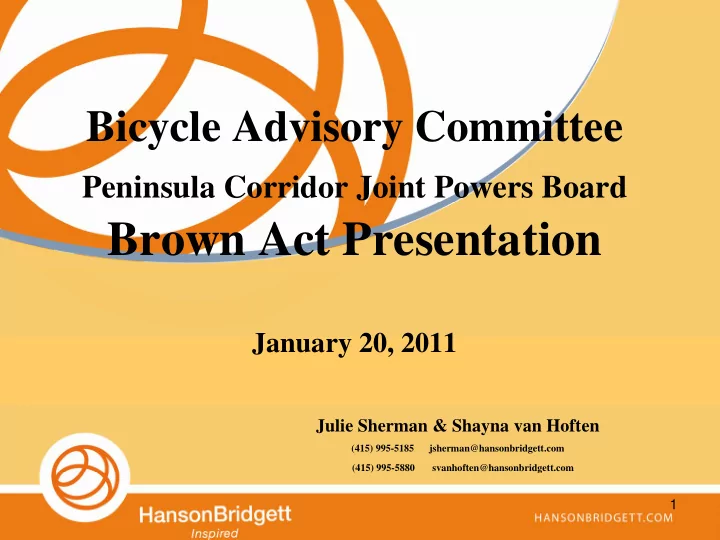

Bicycle Advisory Committee Peninsula Corridor Joint Powers Board Brown Act Presentation January 20, 2011 Julie Sherman & Shayna van Hoften (415) 995-5185 jsherman@hansonbridgett.com (415) 995-5880 svanhoften@hansonbridgett.com 1
Government Ethics Laws • Minimum standard • Not always common sense • Appearances matter – Media/Public Opinion 2
The Brown Act The Legislature finds and declares that the public commissions, boards and councils and the other public agencies in this State exist to aid in the conduct of the people’s business. It is the intent of the law that their actions be taken openly and that their deliberations be conducted openly. The people of this State do not yield their sovereignty to the agencies which serve them. The people, in delegating authority, do not give their public servants the right to decide what is good for the people to know and what is not good for them to know. The people insist on remaining informed so that they may retain control over the instruments they have created. Government Code Section 54950 3
Who Is Subject To the Brown Act? – Legislative Body – Any Committee created by Board of Directors – Any Committee Created by Committee – Applies to BAC • Agency Policy • Charter 4
What Does the Brown Act Require? • Local legislative bodies’ meetings • Open and public • Agenda • Public comment • Penalties/Enforcement 5
What’s a “Meeting”? • Majority of members of legislative body • Same place and time • Hear, discuss, deliberate or take action • Within subject matter jurisdiction of legislative body 6
What is not a “Meeting”? • Contact between Member and a Non-Member • Conference open to public – but no caucusing or discussion among members about business within the body’s subject matter jurisdiction 7
Closed Session Exception • Limited topics, usually just for JPB Board • Very unlikely to apply to BAC • Specified format, notice, requirements • Ask counsel first! • Duty of confidentiality 8
Risky Business: Quorums outside of noticed meetings § 54952.2 (b) (1) A majority of the members of a legislative body shall not, outside a meeting authorized by this chapter, use a series of communications of any kind, directly or through intermediaries, to discuss, deliberate, or take action on any item of business that is within the subject matter jurisdiction of the legislative body. • Serial conversations • Social engagements • Other agencies’ • E-mail, chat rooms, and other meetings technology 9
Frequently Asked Questions & Special Points • Can I call in? • I know it’s not on the agenda, but… • Can we go back to that item from last time? • Can I respond to that? • What if there is less than a quorum? 10
Recommend
More recommend